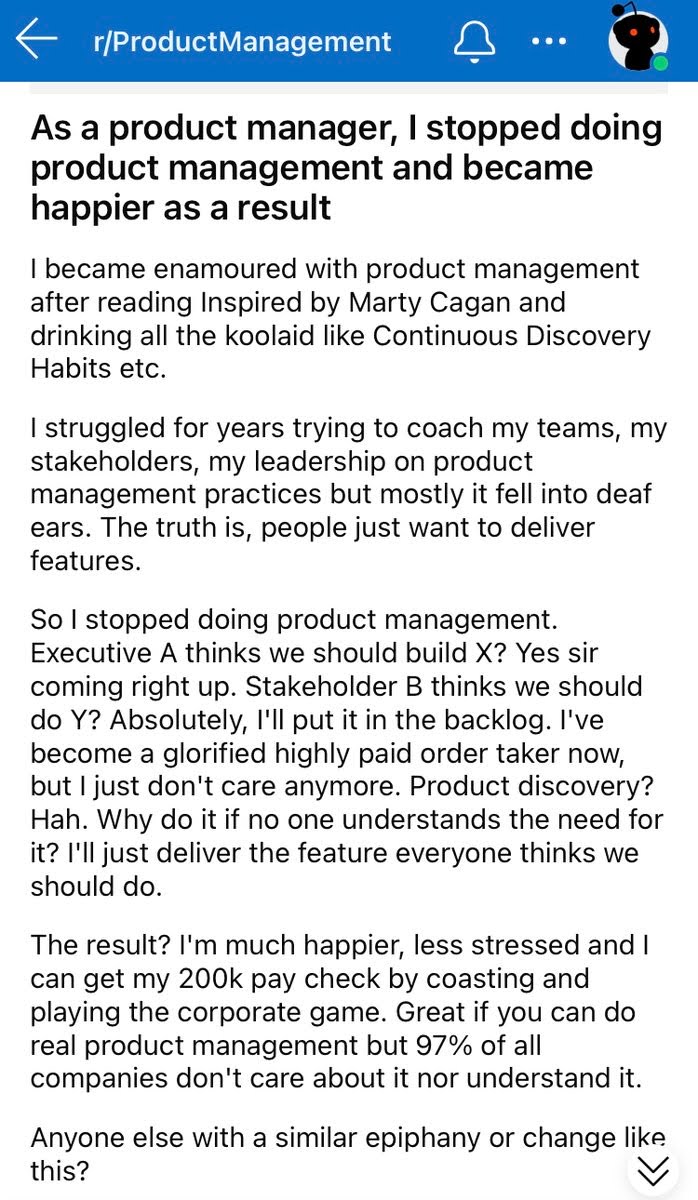There are plenty of articles out there about good product managers vs. bad product managers, outlining all the right (and wrong) things one can do to embody each. While I have certainly experienced bad product management in the past, I think it’s important to highlight what actually leads a product manager down the wrong path. To be honest, candid, and leaving all BS aside, the real answer to this is: bad leadership.
Bad leadership leads to bad product management.
To quote Brian Chesky: Agile killed the product manager.
But it’s not really Agile is it? It’s bad Agile. It’s teams that are measured on how fast they release things rather than how well they build for value. Move fast and break things ruined it for all of us. We really should have been focusing on learning things quickly.
The influence of leadership in product management
Leadership in any organization sets the tone for its operations and culture. A product manager equipped with all the right skills and qualifications might still struggle if their leadership does not support experimentation, risk management, customer engagement, and rapid learning.
A few weeks ago a post on Reddit blew up when a product manager admitted his life was a lot more stress-free since he decided to simply do whatever his leadership wanted without him even trying to say otherwise. This person has literally given up trying to do their job.

Claire Vo, Chief Product and Engineering Officer at Color, refers to this as the “academic theatre of product management.”
Product managers don’t need more frameworks, tips, or podcasts (don’t come at me) - what they need is good leadership.
More often than not, good leadership requires one of three things:
Awareness that there is a problem.
Awareness that they might be part of the problem.
Awareness that help is needed to solve the problem.
Vulnerability and openness are one of the two most powerful tools at the disposal of anyone in a leadership position. Nobody expects leadership to know it all, but the right guidance and focus are required to empower a team to go solve problems. Unfortunately, sometimes that guidance is murky at best, and then product managers take the fall for not knowing how to move the company forward.
So what does it take to be a good leader?

Empowering vs. restrictive leadership
Empowering leadership styles: Empowering leaders believe in delegating authority and encouraging their product managers to take ownership of their projects. This leadership style is characterized by providing guidance without micromanaging, allowing product managers the freedom to explore innovative solutions and take calculated risks. Such an environment not only nurtures creativity but also instills a sense of responsibility and ownership in product managers. They are more likely to think outside the box and propose solutions that could lead to significant breakthroughs in the market.
Consequences of restrictive leadership: On the flip side, a restrictive leadership approach can significantly dampen a product manager's ability to innovate. This style often involves micromanaging, with leaders making most decisions and leaving little room for product managers to experiment. The focus tends to shift towards immediate outputs, neglecting the importance of long-term outcomes. This short-sighted approach can lead to a cycle of producing features that may not necessarily align with the market needs or the product's strategic vision, ultimately hindering the product's success.
The role of trust and autonomy
Building trust and granting autonomy: Trust is a two-way street. When leaders trust their product managers, it's a signal of confidence in their capabilities and judgment. This trust is often rewarded with high levels of engagement and innovation from product managers. Autonomy goes hand-in-hand with trust. By granting autonomy, leaders empower product managers to make key decisions, manage their time, and prioritize tasks in a way that aligns best with the product's goals. This autonomy enables them to maneuver through challenges more efficiently and make decisions that are in the best interest of the product.
Benefits of a trusting environment: In an environment where trust and autonomy are prevalent, product managers feel more valued and motivated. They are more likely to take initiative, think creatively, and commit themselves fully to the product's success. This enhances the product's development and contributes to a positive organizational culture where people feel encouraged to contribute their best work.

Feedback and learning
Encouraging a culture of feedback: Continuous learning is crucial in the ever-changing field of product management. Leaders have to focus on creating an environment where feedback helps product managers grow and adapt. This feedback should not be one-sided; it's important for product managers to feel comfortable providing feedback to leadership as well. Such an exchange of insights and suggestions can lead to more effective strategies and avoid potential pitfalls.
Learning as a core value: Long are the days of ‘move fast and break things.’ What we want to do is learn. Learn quickly, learn fast, and most importantly - adapt fast. Adapting to changing market trends is imperative, especially in a world where AI is developing faster than we can blink.
Let’s talk about empathy
Let’s go back to the original question though, what actually makes a good product manager? We know that leadership plays a big part of it, but what is definitely a must when it comes to shining as a PM?
Empathy.
Empathy directly influences how PMs approach problem-solving, team dynamics, and stakeholder communication.
The core of product management is identifying and solving user problems. Empathy enables product managers to truly understand these problems from the user's perspective, leading to more effective and user-centric solutions. It's about moving past assumptions and biases to uncover what users genuinely need, not just what the product team thinks they need.
And trust me, I know it’s not easy. Having your EQ on at all times can actually be quite exhausting, which is why empathy is also a skill one must have for oneself. Knowing when to say no, when to put up boundaries, and even when to disconnect from work is equally important.
I’ve worked with PMs who had absolutely no empathy for others and simply wanted to play at their ego and have everyone compliment them on what a great job they were doing. Unfortunately, this resulted in broken relationships, lack of trust, and a team that quite frankly, hated each other.
If you’re looking to be the superstar of the show, product management might not be for you.

Conclusion
The journey of a product manager is intricately tied to the quality of leadership and the depth of their empathy. Leadership that is empowering and trusting, which cultivates a learning-focused atmosphere, sets the stage for product managers to truly excel. This style of leadership is less about strict control and more about guidance, support, and enabling growth. It recognizes the potential in each product manager and provides the necessary conditions for that potential to flourish.
Together, empathetic leadership and profound empathy form the foundation for success in product management. They enable product managers to enhance their products and the people they collaborate with.
For those aspiring to excel in product management or already navigating its path, it's crucial to remember that your success hinges on both the environment in which you work and your personal skills and attributes.
Seek environments that promote and value good leadership and empathy. And for those in leadership positions, aim to be the kind of leader who brings out the best in your product managers. Ultimately, the finest products are nurtured by great leadership and empathy, every step of the way.

Andrea Saez

Read also
Experience the new way of doing product management





